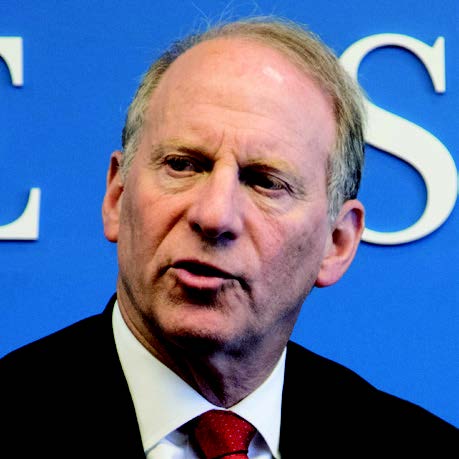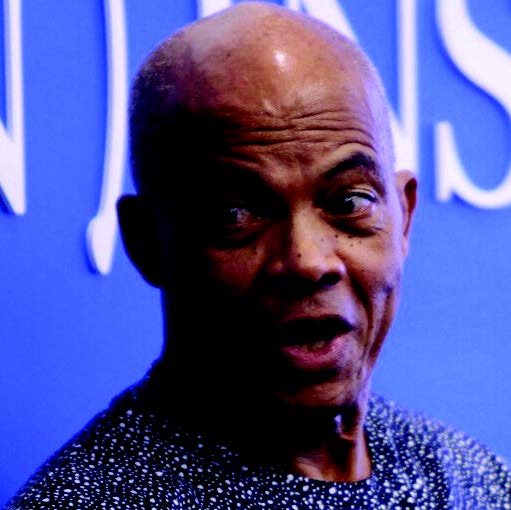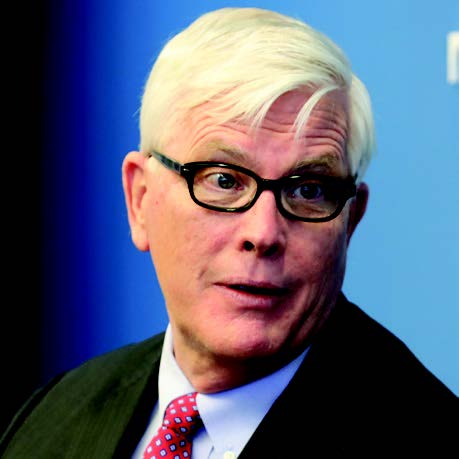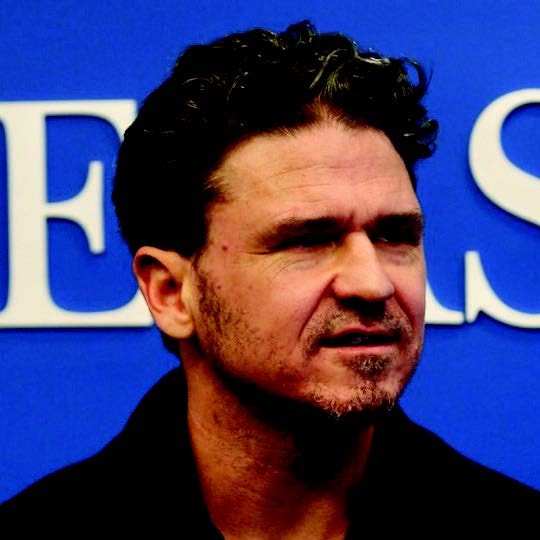Each year, the Alma and Joseph Gildenhorn Book Series brings in the authors of some of the world’s best newly released books for deep explorations of culture, history, technology, and the political zeitgeist. Hosted at the Institute’s Washington, DC, headquarters, this year the series brought ten unique voices to our stage to discuss Asia policy, life on Alaska’s frontier, modernity’s ceaseless acceleration, foreign-affairs chaos, Republican chaos, the resonance of Emmett Till, the big business of big health care, and America’s surging war machine. Below are just a few highlights.
 Rosa Brooks
Rosa Brooks
Georgetown University Law Center Professor and New America Senior Fellow
How Everything Became War and the Military Became Everything; Tales from the Pentagon
“The blurriness of the boundaries between war and peace that has happened in such a subtle way across so many different domains that we tend not to notice how radically the world is changing around us. When you think of the world as a place where the next threat—a bioengineered virus, a cyberattack, another terror attack using nontraditional weapons—could come from anywhere and be anything, then the military is going to say, We’ve got to do everything everywhere. When everything is potentially war, everything is a job for the military.”
 Kurt Campbell
Kurt Campbell
Chairman and CEO, The Asia Group, LLC
The Pivot: The Future of American Statecraft in Asia
“Previous efforts on North Korea have failed: diplomacy, some sanctions. We need to have a wholesale re-look at the way forward. North Korea is relatively lightly sanctioned, and if you compare the sanction regimes that we have used against Iran, against Cuba, and even Myanmar—much more intense. We have to think carefully about targeted financial sanctions that will essentially hold at risk 2,000 to 3,000 of the North Korean elite.”
 Elisabeth Rosenthal
Elisabeth Rosenthal
Editor-in-Chief, Kaiser Health News
An American Sickness: How Healthcare Became Big Business and How You Can Take It Back
(Book Excerpt) “In other countries, when patients recover from a terrifying brain bleed—or, for that matter, when they battle cancer, or heal from a serious accident, or face down any other life-threatening health condition—they are allowed to spend their days focusing on getting better. Only in America do medical treatment and recovery coexist with a peculiar national dread: the struggle to figure out from the mounting pile of bills what portion of the fantastical charges you actually must pay. It is the sickness that eventually afflicts most every American.”
 Richard Haass
Richard Haass
President and CEO, Council on Foreign Relations
A World in Disarray: American Foreign Policy and the Crisis of the Old Order
“Entropy is the natural order of things, the natural state of things, and it’s important to keep that in mind, because the world, if left to its own devices, doesn’t ever sort itself out; it is in ever-increasing disarray. That’s important, because you can’t just park it, return to it, and expect that it’s going to be in better shape than when you left it. The Cold War is part of it, but there’s also the rise of certain countries like China, the phenomenon of globalization, and a phenomenon where more and more actors had more centers of capacity and decision-making, including non-state actors.”
 John Edgar Wideman
John Edgar Wideman
Professor of Africana Studies and Literary Arts, Brown University
Writing to Save a Life: The Louis Till File
“Mamie Till is hoping for justice, sitting in a courtroom, and a newspaper story breaks that the father of the young man, Emmett, who was murdered, turns out not to be an American hero, not an American soldier who died defending his country, but this dude who was hanged by the U.S. military for rape and murder in Italy ten years previously. You can imagine the head shaking, Uh-huh, Bad seed. Seed never falls far from the tree. And so the informal logic to explain the lynching, the murder, of Emmett Till became almost a form of self-congratulation.”
 Thomas Friedman
Thomas Friedman
Foreign Affairs Columnist, The New York Times
Thank You for Being Late: An Optimist’s Guide to Thriving in the Age of Accelerations
“The year 2007 may be seen in time as one of the greatest technological inflection points since Gutenberg. An incredible release of energy happened in and around that year and it changed power: It changed the power of one. We have a president-elect who can sit in his penthouse and communicate directly—unfiltered by any other medium—to hundreds of millions of people around the world. What’s scarier is the head of ISIS can do the same thing from Raqqa Province.”
 Hugh Hewitt
Hugh Hewitt
Nationally Syndicated Radio Host, The Hugh Hewitt Show
The Fourth Way: The Conservative Playbook for a Lasting GOP Majority
“Media that the purveyor knows is objectively false at the time they put it into circulation is fake news—that takes biased news out of the equation. I’m biased, I have an opinion, it’s not fake, it’s what I believe in. It might be wrong, but it’s not fake. On the other hand, if cyber warriors are creating fake news for the purposes of delegitimizing American initiative abroad, it’s propaganda, it’s cyber warfare, and it’s an instrument of cyber power.”
 Dave Eggers
Dave Eggers
Best-Selling Author, Founder of McSweeney’s, and Co-Founder of 826 National
Heroes of the Frontier
(Book Excerpt) “There is proud happiness, happiness born of doing good work in the light of day, years of worthwhile labor, and afterward being tired, and content, and surrounded by family and friends, bathed in satisfaction and ready for a deserved rest—sleep or death, it would not matter. Then there is the happiness of one’s personal slum. The happiness of being alone, and tipsy on red wine, in the passenger seat of an ancient recreational vehicle parked somewhere in Alaska’s deep south, staring into a scribble of black trees, afraid to go to sleep for fear that at any moment someone will get past the toy lock on the RV door and murder you and your two small children sleeping above.”

